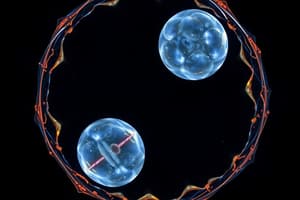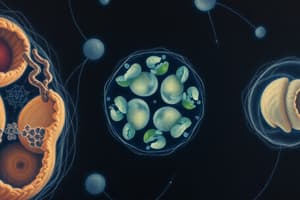Podcast
Questions and Answers
During which phase of the cell cycle do homologous chromosomes align along the metaphase plate?
During which phase of the cell cycle do homologous chromosomes align along the metaphase plate?
- G2 phase
- Metaphase I (correct)
- S phase
- G1 phase
What is characteristic of apoptosis?
What is characteristic of apoptosis?
- Chromatin condensation and formation of apoptotic bodies (correct)
- Release of cellular contents and inflammation
- Cell swelling and plasma membrane rupture
- DNA replication and cell growth
What regulates the cell cycle by inhibiting cyclin-dependent kinases?
What regulates the cell cycle by inhibiting cyclin-dependent kinases?
- Cyclins
- CDK inhibitors (correct)
- p21 and p27
- DNA replication
What occurs during Anaphase I of meiosis?
What occurs during Anaphase I of meiosis?
Which phase of the cell cycle is characterized by preparation for DNA replication?
Which phase of the cell cycle is characterized by preparation for DNA replication?
What is the difference between mitosis and meiosis?
What is the difference between mitosis and meiosis?
During which phase of mitosis do sister chromatids separate and move to opposite poles of the spindle?
During which phase of mitosis do sister chromatids separate and move to opposite poles of the spindle?
What is the significance of cytokinesis in the cell cycle?
What is the significance of cytokinesis in the cell cycle?
What distinguishes apoptosis from necrosis?
What distinguishes apoptosis from necrosis?
Which phase of the cell cycle involves the alignment of chromosomes at the metaphase plate?
Which phase of the cell cycle involves the alignment of chromosomes at the metaphase plate?
Flashcards
Mitosis
Mitosis
Nuclear division resulting in two identical daughter cells.
Meiosis
Meiosis
Cell division in germ cells, producing four haploid daughter cells.
Cyclin-Dependent Kinases (CDKs)
Cyclin-Dependent Kinases (CDKs)
Enzymes that regulate the cell cycle, activated by cyclins.
G1 Phase
G1 Phase
Signup and view all the flashcards
S Phase
S Phase
Signup and view all the flashcards
G2 Phase
G2 Phase
Signup and view all the flashcards
M Phase
M Phase
Signup and view all the flashcards
Apoptosis
Apoptosis
Signup and view all the flashcards
Necrosis
Necrosis
Signup and view all the flashcards
Study Notes
The Cell Cycle and Biology
The cell cycle is a fundamental biological process that involves the duplication and division of cells to produce two genetically identical daughter cells. This process is essential for the growth and maintenance of all living organisms, from bacteria to humans. The cell cycle is divided into distinct phases, each with specific cellular events and regulatory mechanisms. These phases include mitosis, meiosis, cell division regulation, cell cycle phases, apoptosis, and necrosis.
Mitosis
Mitosis is the process of nuclear division, which occurs during the M phase of the cell cycle. It is characterized by the following stages:
- Prophase: The chromatin condenses, the nuclear envelope breaks down, and the spindle fibers begin to form.
- Prometaphase: The chromosomes align along the metaphase plate at the equator of the spindle.
- Metaphase: The chromosomes remain at the metaphase plate, awaiting separation.
- Anaphase: The sister chromatids separate and move to opposite poles of the spindle.
- Teleophase: The separated chromatids decondense and reform nuclei.
- Cytokinesis: The cytoplasm divides, and the cell is pinched in two, forming two genetically identical daughter cells.
Meiosis
Meiosis is a specialized form of cell division that occurs in the germ cells (sperm and egg cells) to produce haploid daughter cells. It involves two nuclear divisions, each with meiosis-specific events:
- Prophase I: Chromosome pairing, synapsis, and crossing-over occur.
- Metaphase I: Homologous chromosomes align along the metaphase plate.
- Anaphase I: Homologous chromosomes separate and move to opposite poles of the spindle.
- Teleophase I: The separated chromosomes decondense and reform nuclei.
- Cytokinesis: The cytoplasm divides, and the cell is pinched in two, forming two haploid daughter cells.
- Meiosis II: This second meiotic division is similar to mitosis, with the separation of sister chromatids and formation of four haploid daughter cells.
Cell Division Regulation
Cell division is regulated by various mechanisms, including cyclin-dependent kinases (CDKs), cyclins, and CDK inhibitors. CDKs depend on cyclins for their kinase activity, and the levels of cyclins increase during the cell cycle, driving cell cycle progression. CDK inhibitors, such as p21 and p27, can arrest the cell cycle by inhibiting the activity of CDKs.
Cell Cycle Phases
The cell cycle is divided into distinct phases:
- G1 phase: This phase is the cell's resting state before entering the cell cycle. It is characterized by cell growth and preparation for DNA replication.
- S phase: This is the phase of DNA replication, where the cell's DNA is copied.
- G2 phase: This phase is the cell's final resting state before entering mitosis. It is characterized by cell growth and preparation for cell division.
- M phase: This phase is the phase of cell division, including mitosis and cytokinesis.
Apoptosis and Necrosis
Apoptosis and necrosis are two types of programmed cell death:
- Apoptosis: This is a controlled, orderly process of cell death that occurs in response to various stimuli, such as DNA damage or developmental signals. It is characterized by cell shrinkage, chromatin condensation, and fragmentation of the nucleus and cytoplasm into apoptotic bodies, which are engulfed by neighboring cells or macrophages.
- Necrosis: This is a type of uncontrolled, non-programmed cell death that occurs due to severe damage to the cell, such as trauma, ischemia, or toxic substances. It is characterized by cell swelling, rupture of the plasma membrane, and release of cellular contents, leading to inflammation.
In summary, the cell cycle is a complex and highly regulated process that is essential for the growth, maintenance, and reproduction of all living organisms. Understanding the mechanisms and regulation of the cell cycle is crucial for studying various biological processes, including development, aging, and disease, and for the development of new therapeutic strategies.
Studying That Suits You
Use AI to generate personalized quizzes and flashcards to suit your learning preferences.




